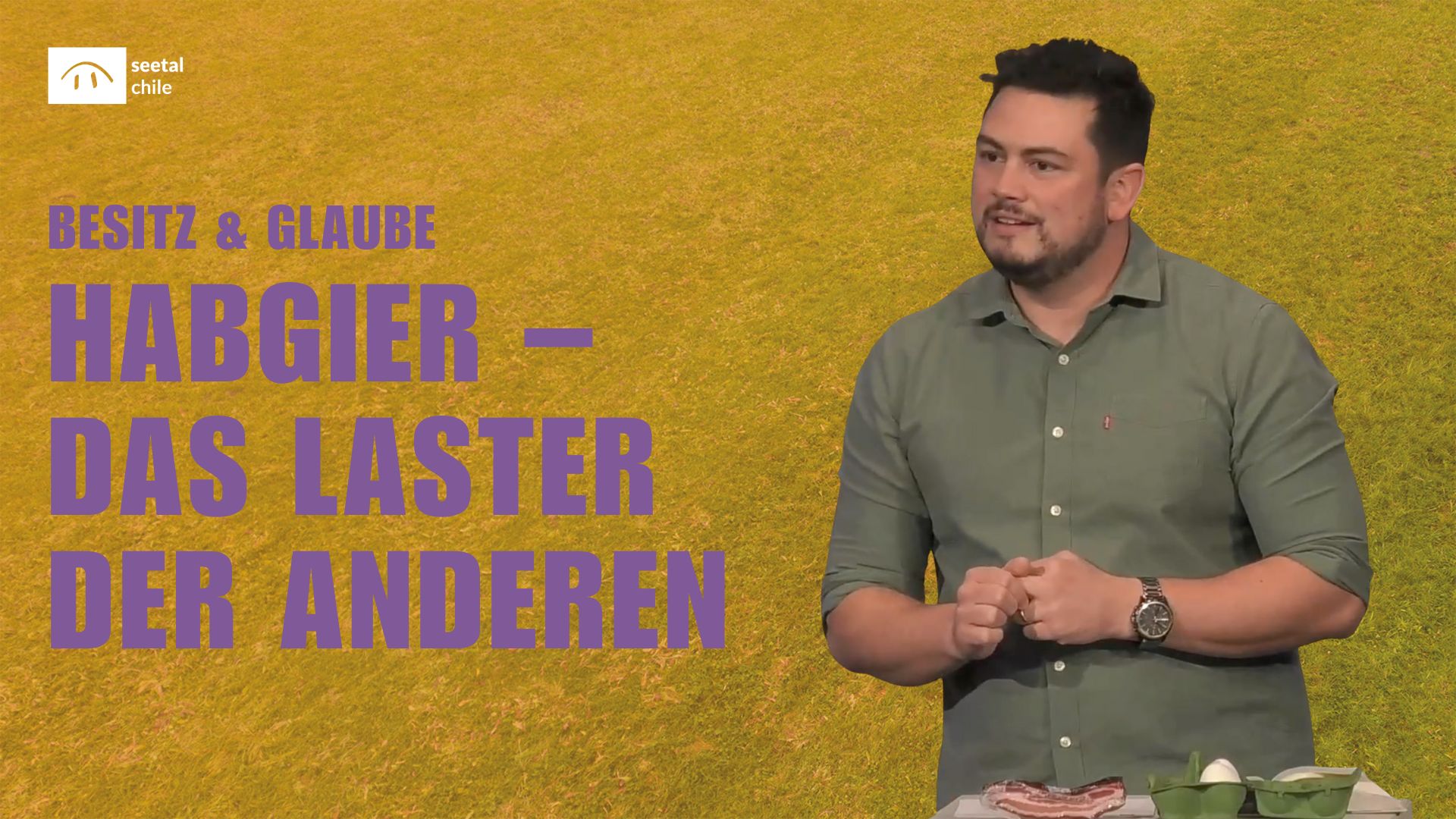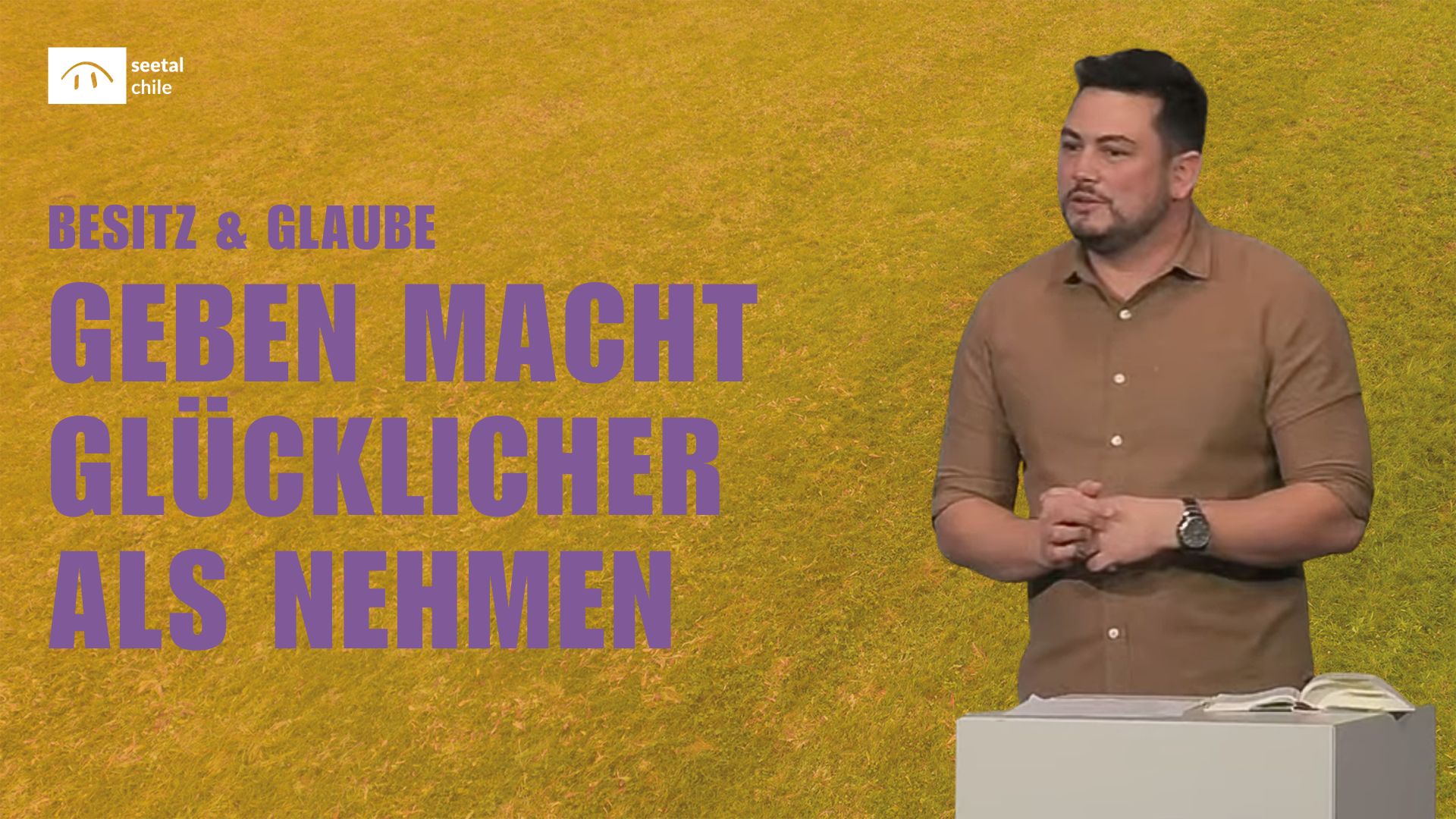Discipleship – the first thing belongs to God
Series: Follow me | Bible text: Leviticus 23:9–14; 1 Corinthians 15:12–23; Colossians 1:18
The people of Israel were instructed to celebrate festivals at certain times as soon as they were in the Promised Land. One of these is the Feast of Firstfruits. The first part of the grain harvest belongs to God. Only when this has been sacrificed may the rest be eaten. Jesus Christ rose from the dead on the Feast of Firstfruits. In a sense, he is also the first of many, as is the case with grain – he is the first to rise from the dead. Through the resurrection of Jesus, followers of Jesus have the certainty that they too will one day rise from the dead. The firstfruits is a principle that expresses two things. On the one hand, it is a sign of gratitude towards God’s care and mercy. On the other hand, it indicates that «there is more to come».
The first harvest belongs to God
«You should celebrate the festivals as they fall» was a song that was published almost fifty years ago. This morning we are going to talk about a feast. A celebration has the character of a remembrance and also of looking forward. Good things are remembered and this is usually followed by a look ahead to what may yet come. There are also some festivals in the Jewish-Christian tradition. These are part of the faith. There are two types of festivals. On the one hand, there are those in the annual cycle, such as Christmas and Easter. On the other hand, there are various festivals in life transitions. There are festivals in connection with birth, the attainment of religious maturity, marriage and, last but not least, death and funerals. Festivals are an expression of the fact that God has led us this far and will continue to do so beyond. The people of Israel were promised a land by God. They will farm there. God is a God of life. He gives life and everything that goes with it. He is a God who is at the centre of life. He therefore gives instructions for a sacrificial feast that is connected to the first harvest. The people of Israel receive these instructions even before they have seen the Promised Land. «Then the LORD commanded Moses, «Give these instructions to the Israelites: «When you come into the land that I will give you and bring in the grain harvest, you shall give the first sheaf of your grain to the priest. […] Until that day, until you have offered this sacrifice to your God, düYou don’t get any bread and noöeat fresh grain from the new harvest. This order applies toüalways forüfor you and your descendants, wherever you live» » (Leviticus 23:9–14 NLB). This feast is the feast of the so-called firstfruits. It concerns the first part of the harvest, the first sheaf of grain that was bound together. This feast immediately follows the Passover. At Passover, the people remember the Exodus from Egypt. I preached more extensively about this on Good Friday, so I will not go into it further here. At the Feast of Firstfruits, the people offer the first harvest to God. This is the focus of today’s sermon. This feast is followed by the Feast of Weeks (Shavuot). Which is celebrated seven weeks plus one day after Passover – i.e. a total of fifty days afterwards. It is a harvest festival and I will only mention it in passing today.
For some time now, we have been focussing on the people of Israel. I would like to take a brief look at the understanding of the relationship with God in the Old and New Testaments. It is often understood in this way: The Old Testament was about the law. In the New Testament, the focus is entirely on grace. It seems as if we are dealing with a different God or at least a different relationship with God. But this is not the case. «Everything that is good and perfect is given to us from above, from God, who created all the lights of heaven. Unlike them, he does not change, nor does he alternate between light and darkness» (James 1:17 NLB) God does not change. But why then can the feeling arise that the God of the Old Testament is different from the God of the New Testament? In my opinion, this is due to the too firm focus on the law in the Old Testament. It would therefore be appropriate to change the understanding. The new and old covenants are rooted in God’s act of salvation. In the New Testament, Jesus Christ takes the guilt of the world upon himself and pays for it. In the Old Testament, God leads Israel out of Egypt – before any human obligation. Even in the Old Testament, no one is saved on the basis of their own performance. It is therefore also significant that the Feast of Firstfruits comes after the Passover. The feast in which people are supposed to do something for God follows the feast that reminds us of what God has done for mankind.
The Feast of Firstfruits is a reminder of this and shows that everything should begin with God: Everything should be started with God and everything depends on him. In the Old Testament it is said that not only the first grain belongs to God. But also «Consecrate to me all the firstborn sons of the Israelites and every firstborn male animal. They are mine!» (Exodus 13:2 NLB). By conceding these things to God, the grateful recognition of God’s mercy is shown. It is an expression of the fact that everything belongs to God and that provision depends on him.
Succession from the perspective of the first fruits
So what does this feast of first fruits mean in concrete terms for my following of Jesus? In practical terms, this can be seen in rituals of gratitude. In our family, this is most evident at mealtimes. To a certain extent, festivals fulfil the same function. They are rituals of gratitude and remembrance. Around the Feast of Firstfruits in particular, there are a total of three feasts that are related to Christian holidays. Firstly, there is the Passover. Our Good Friday originated from this. On this day, an innocent lamb had to die as a substitute for the guilt of mankind. In the end, Jesus died for the guilt of mankind and thus reconciled creation with God. This is followed by the Feast of Firstfruits. The first of the harvest of the promised land belongs to God. Easter Sunday, the day of Jesus Christ’s resurrection from the dead, corresponds exactly to this day. Jesus is the first of the New Creation. «[…]. He is the beginning and the first to rise from the dead, so that he may be first in everything» (Colossians 1:18 NLB). Followers of Jesus share in the resurrection. Jesus died as a lamb at Passover and rose again at the Feast of Firstfruits. The third feast is Shavuot. It is the harvest festival on the 50th day after Passover. The Christian holiday of Pentecost corresponds to this and thus got its name. Pentekoste is Greek and means «the fiftieth». On this holiday, the Holy Spirit came upon the followers of Jesus.
The firstfruits are an indication that there is more to come. The Israelites trusted God that there was more to come. They confidently shared the first, in the knowledge of their dependence on God. The resurrection of Jesus Christ on Easter Sunday is central for followers. This is argued at length by Paul and I do not want to withhold this from you. «But now I ask you: If we preach that Christ has risen from the dead, how can some of you say that there is no resurrection of the dead? If there is näIf there is no resurrection of the dead, then Christ has not risen either. And if Christ has not risen, then our preaching was worthless and your trust in God is also in vain. Yes, in this caseäIf we apostles even had Lügen üWe have affirmed that God raised Christ from the dead, and this cannot be true if there is no resurrection from the dead. For if there is no resurrection of the dead, then Christ has not risen either. But if Christ is not risen, then your faith is useless, and you are still in your sütrapped in the ground. In this caseäall people who have died in faith in Christ are lost! If faith in Christ is only forüIf this life gives us hope, we are the most miserable people in the world» (1 Corinthians 15:12–19 NLB). Because Jesus rose from the dead, followers of him know that there is more to come. Namely, his own resurrection at the end of days. Followers of Jesus can be confident in their dependence on God. In this way, they can also give back to him something of what God has given them. Because they know that everything comes from God.
Earthly principle with a heavenly end
The feast of the firstfruits is an earthly principle with a heavenly end. Jesus Christ is the type of the firstfruits. This means that Jesus is the fulfilment of what is indicated here in the Old Testament. The resurrection of the dead has already been briefly alluded to. Followers of Jesus share in the resurrection of Jesus. We continue reading in Corinthians. «But now Christ is the first to rise from the dead. Just as death came into the world through one man – Adam – the resurrection from the dead has now begun through another man – Christ. People die because they are all related to Adam. Likewise, through Christ all are made alive and receive new life. But there is an order: Christ first, and when he comes again, then those who belong to him» (1 Corinthians 15:20–23 NLB). Jesus is the first. The Greek word here is «aparche», which means firstfruits. This word is also used in the translation of the Old Testament from Hebrew into Greek. This means that Jesus is the firstfruits laid out in the Old Testament. The firstfruits is a reference to more. It is a reference to the resurrection from the dead at the return of Jesus Christ. It has not yet happened, but it is a reference to it.
For the Israelites, the Promised Land was the goal of their longing. When the people crossed the Jordan, they entered the promised land. There they celebrate the Passover. «On the day after the Passover, they ate unleavened bread and roasted grain that they had harvested in the new land. From that day on, there was never again any manna, and the Israelites fed on the fruit of Canaan that very year» (Joshua 5:11–12 NLB). The manna ceased. But not God’s provision. From now on, God provides his people with grain, etc. As a thankful acknowledgement of God’s mercy, they should now celebrate the Feast of Firstfruits. For the followers of Jesus, eternity with God is the goal they long for. Once they are united with God. The Holy Spirit, who works in the followers, gives so-called spiritual gifts here on earth. In his letter to the Corinthians, St Paul writes a treatise on various such gifts which the Spirit of God bestows. At the end he writes: «Love will never cease, even if prophecy, speaking in unknown languages and knowledge will pass away. Now we recognise only a little, and even our prophetic speech reveals only a little! But when perfection appears at the end, the little will cease.öI was a child. When I was a child, I talked and thought and made judgements like a child. But when I grew up, I shed my childishness. Now we still see things imperfectly, as if in a dream.üI will not be able to see myself in a mirror, but then we will recognise everything with complete clarity. Everything I know now is incomplete, but then I will recognise everything as God already knows me. Faith, hope and love, these three remain. But the greatestössis love» (1 Corinthians 13:8–13 NLB).
In Jesus Christ, the type of firstfruits, followers of Jesus know that they too will rise from the dead. The earthly principle is that everything belongs to God. Especially the first and the best. The heavenly end means that through the firstfruits of «Jesus», followers of him have a share in it. Jesus expresses this earthly principle with a heavenly end as follows. «Make the kingdom of God your most important concern, live in God’s righteousness and he will give you everything you need» (Matthew 6:33 NLB).
Possible questions for the small group
Read Bible text: Leviticus 23:9–14 and 1 Corinthians 15:12–23
- Festivals mark life transitions or certain moments in the annual cycle. Which Christian festival appeals to you the most? What makes it so special for you?
- Jesus Christ is the type of the firstfruits. He is the fulfilment of what is laid out in the Old Testament. How does this manifest itself? What does this mean for you?
- What does this principle of firstfruits have to say for your following of Jesus?
- How do you feel about the resurrection from the dead? Can you believe in it as clearly as it is written in 1 Corinthians? Where do you have doubts? What prevents you from doing so?




